Corsair Performance Series Pro (256GB) Review
by Kristian Vättö on May 14, 2012 9:10 AM EST- Posted in
- Storage
- SSDs
- Corsair
- Marvell
- Corsair Performance Pro
Random Read/Write Speed
The four corners of SSD performance are as follows: random read, random write, sequential read and sequential write speed. Random accesses are generally small in size, while sequential accesses tend to be larger and thus we have the four Iometer tests we use in all of our reviews. Our first test writes 4KB in a completely random pattern over an 8GB space of the drive to simulate the sort of random access that you'd see on an OS drive (even this is more stressful than a normal desktop user would see).
We perform three concurrent IOs and run the test for 3 minutes. The results reported are in average MB/s over the entire time. We use both standard pseudo randomly generated data for each write as well as fully random data to show you both the maximum and minimum performance offered by SandForce based drives in these tests. The average performance of SF drives will likely be somewhere in between the two values for each drive you see in the graphs. For an understanding of why this matters, read our original SandForce article.
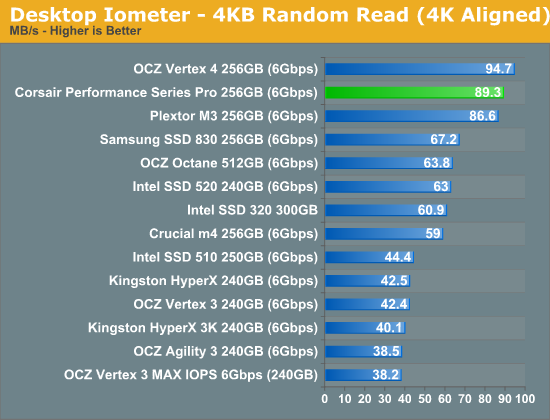
Performance Pro's random read performance is slightly faster than Plextor's M3's but there is essentially no difference. In general the random read performance is excellent, as expected.
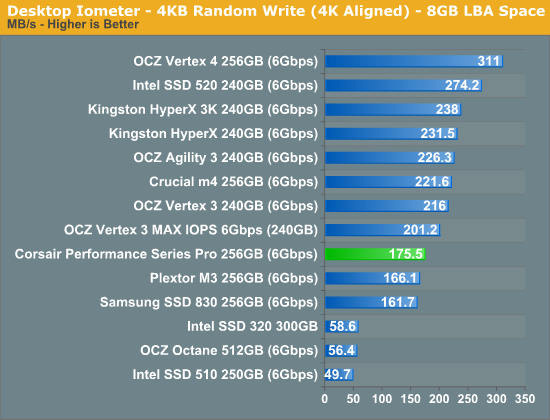
Random write performance is not top-notch but still ~6% faster than what Plextor's M3 provides.
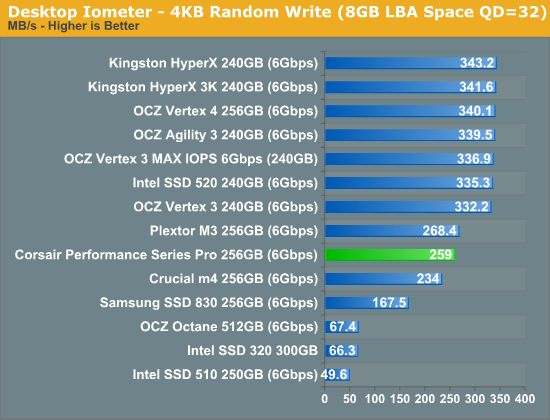
Increasing the queue depth shows an increase in random write performance but this time the M3 is a bit faster. We are only looking at a difference of ~4% though, and it should be noted that most workloads don't use queue depths higher than 5.
Sequential Read/Write Speed
To measure sequential performance we ran a one minute long 128KB sequential test over the entire span of the drive at a queue depth of 1. The results reported are in average MB/s over the entire test length.
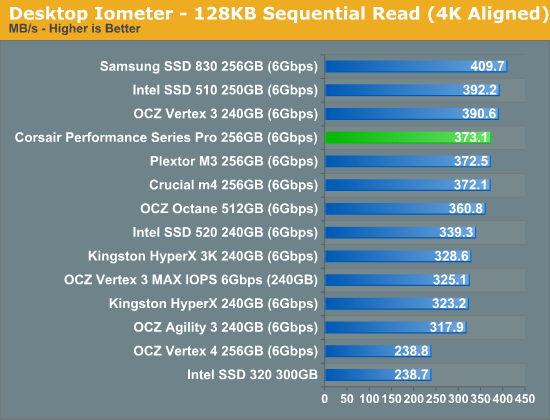
Again, identical performance with Plextor M3 and this time Crucial's m4 joins the chorus as well.
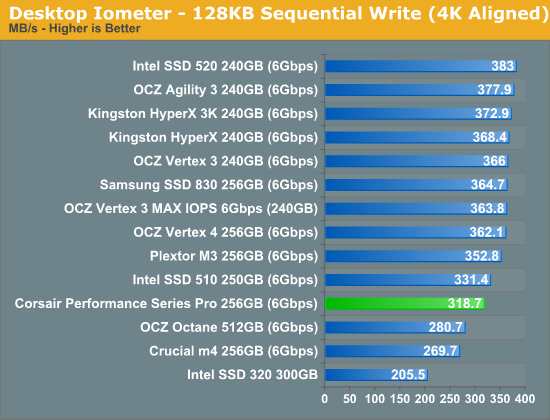
Sequential write introduces some surprises. Plextor M3 is 34MB/s (10.7%) faster here while in other tests the two were much closer to each other. However, one shouldn't pay too much attention to just one test and our Storage Suites should give a much better look at real world performance.










41 Comments
View All Comments
SlyNine - Monday, May 14, 2012 - link
Put a M4 in my GF's computer and she has had no problems at all. Friend also has one and again no problems.Just because you have had issues doesn't mean someone else will, if they were that easily repeatable they would be easy to fix.
ShieTar - Monday, May 14, 2012 - link
Why does this article contain two tables with the exactly same lable "NewEgg Price Comparison (5/5/2012)" but very different numbers?Kristian Vättö - Monday, May 14, 2012 - link
If you loaded the article right when it went live, it's possible that you saw two different tables. I updated the prices just before I posted this, but forgot to copy-paste the new table to the final page. Both tables should be up to date now, though.CyberAngel_777 - Thursday, May 17, 2012 - link
I wish you had two different dates and prices just show the price fluctuationsand then later with updated data also updated prices
every drive should have thickness data recorded
thank you!
Coroder - Monday, May 14, 2012 - link
Does the vertex 4 drive in this test use the new firmware that was made available? It increases the speed in most tests by quite a bit.XJDHDR - Monday, May 14, 2012 - link
I believe they are waiting for the firmware to come out of beta testing.jwilliams4200 - Monday, May 14, 2012 - link
Lite-On owns Plextor, so it is misleading to say that Plextor buys the SSDs from Lite-On. It would be more accurate to say that the Plextor / Lite-On relationship is like the Crucial / Micron relationship.koinkoin - Monday, May 14, 2012 - link
At my company we use McAfee Endpoint Encryption, how does this affect the performance of the drives and how much does this change over time?I went for a Plextor M3 256GB and seem to be working fine as for now, but only got it now for 2weeks.
rlhunts - Monday, May 14, 2012 - link
My company also uses the McAfee Endpoint Encryption. I upgraded the WD 250 GB 7200 RPM drive to a Samsung 830 258 GB SSD in my Dell laptop (I5 2540M processor) a couple months ago. It definitely helps, especially with boot time, but McAfee EE adds a lot of processor overhead, which a drive can't help with. It's still slow as a slug compared to the same machine and software configuration without McAfee with a traditional 7200 rpm hard disk.Movieman420 - Monday, May 14, 2012 - link
In all fairness the Vertex 4 needs to be re-tested with the latest 1.4RC fw...or wait til it's final then flash up.